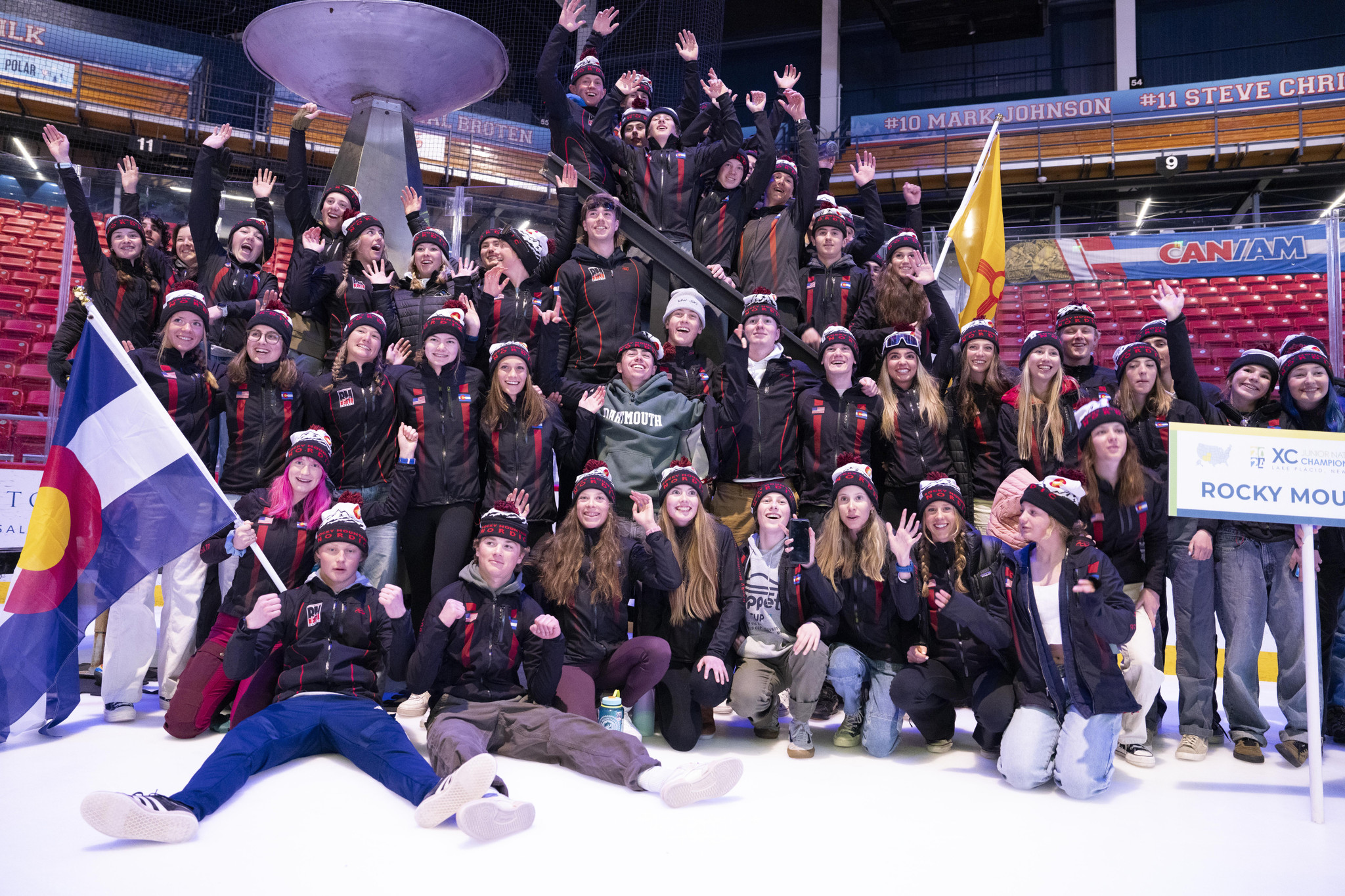
Lake Placid is a place defined by a particular story of a Miracle. USA v. Soviet Union. 1980. Al Michaels. You know the one. We retell the story because we love the idea: something greater than the sum of all its human parts happens when a community’s energy moves in a clearly focused direction. In 1980, it was a hockey team. In 2024, a community’s dream focused on the efforts of young skiers at Junior Nationals, hosted at Mt. Van Hoevenberg for the sixth time since 1982. Miracles happened . . .
Over the course of a four-race program, there were plenty of flashes personal miracles were occurring for many kids in Lake Placid. There was also earnest appreciation of the miraculous snowstorm that arrived, and multiple repeatings of a quip heard throughout the week: “It’s a miracle we’re not on ice.”
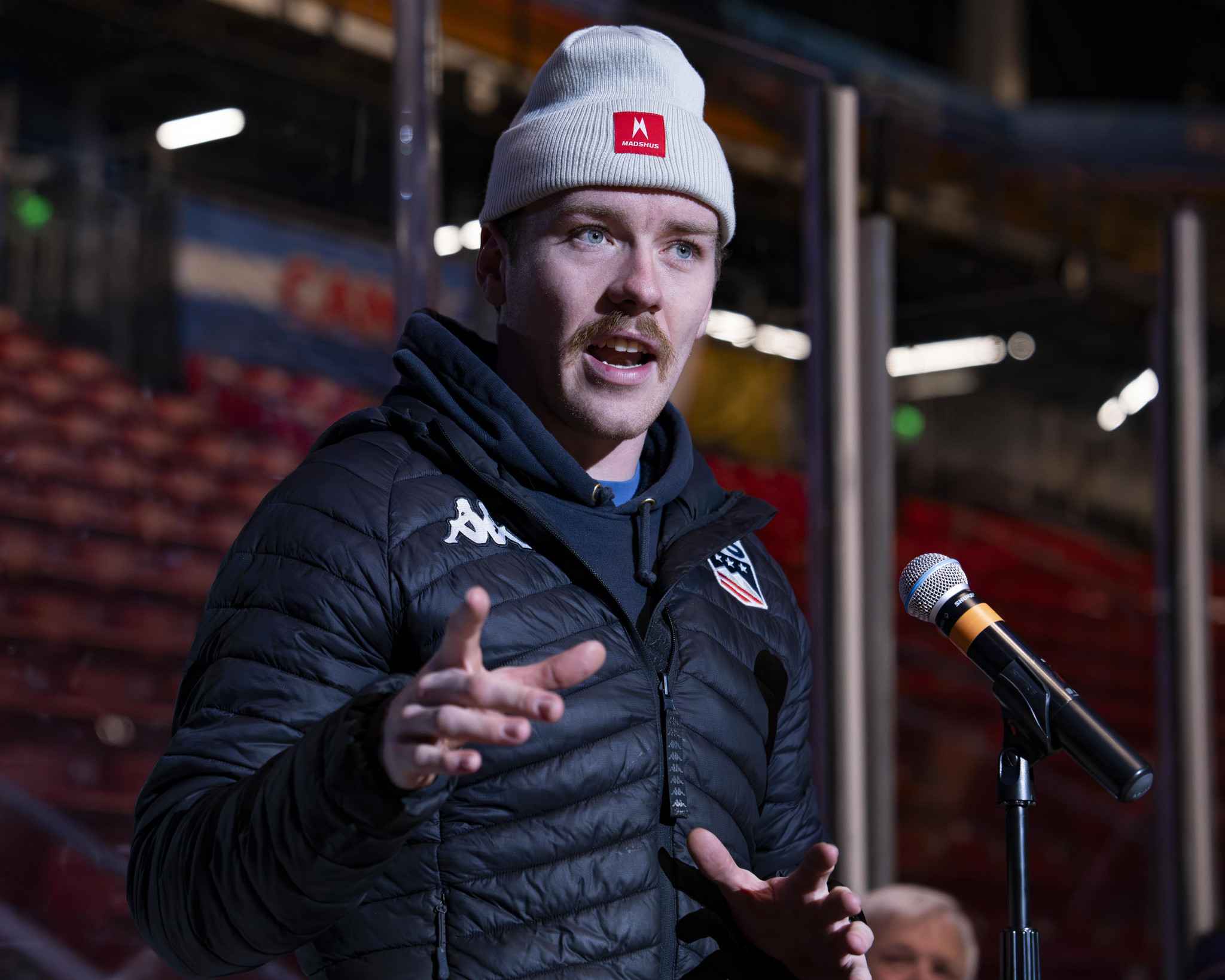
Junior Nationals is the event where ski racers fall in love with ski racing. Junior Nationals continues to hold that special place in the fabric of American skiing: that was evident in the number of ski racers, and former ski racers, who were came to Lake Placid. Ben Ogden was on hand as Master of Ceremonies at the opening ceremony, and commentated the week’s action. The Rocky Mountain Division kids got a pre-sprint-race strategy talk from World Cup sprint winner Sophie Caldwell-Hamilton, and a classic distance mass start talk from David Norris too.
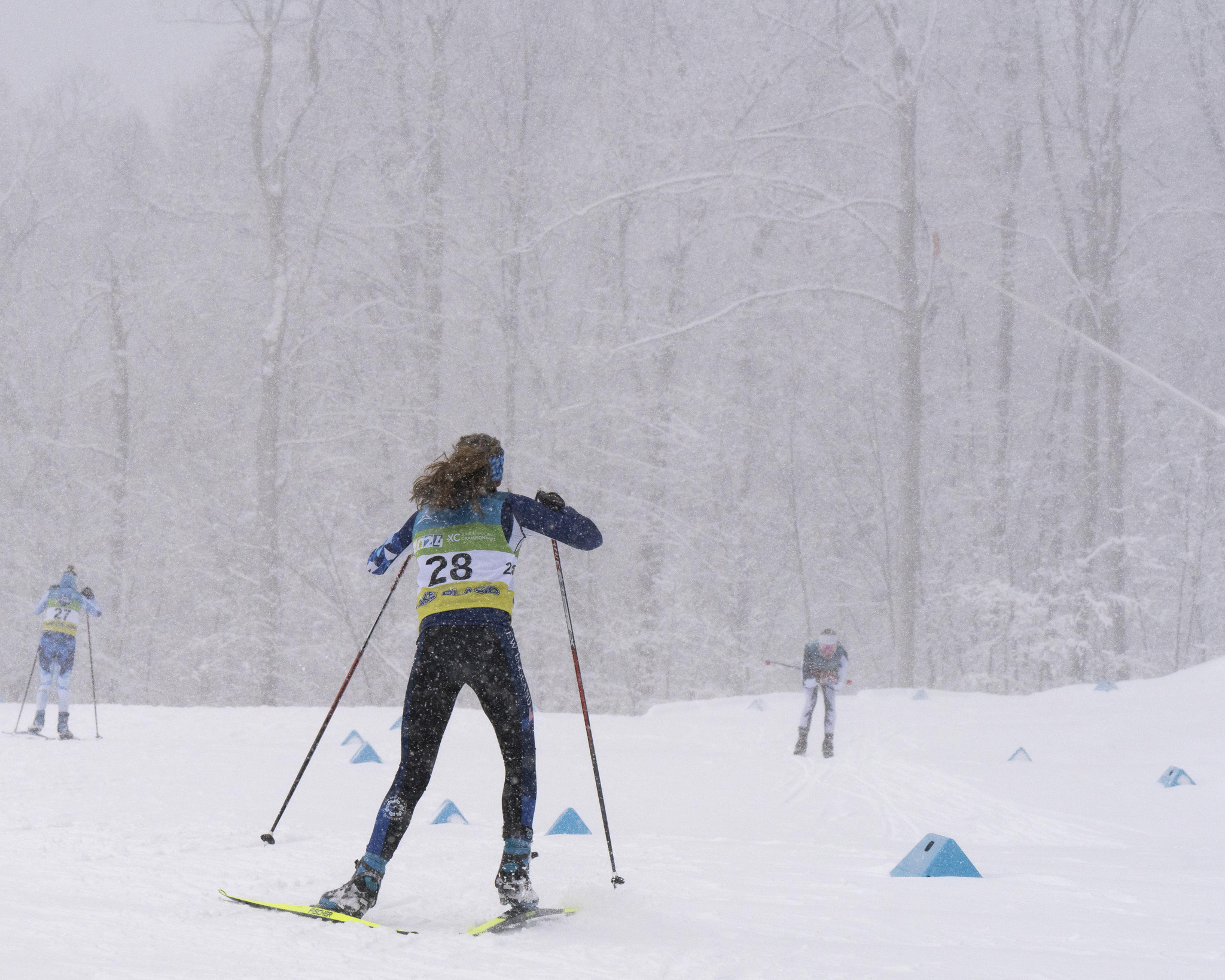
Monday: 7.5 k (U18/20) and 5 k (U16)
Winter in Lake Placid arrived precisely the day before races were scheduled to begin; Sunday produced a Nor’easter: rain, snowflakes, and every variation in between. On Monday morning, temperatures dropped: Junior Nationals would start on a snow day.
The first group to start was the U16 Girls field, set to race a 5 k. Despite slow conditions, the youngest group at JNs still raced the Lake Placid course quick, and raced it tight too. The top-seeded skiers all grouped behind the early starters, and quickly a bar-setter emerged with New England’s Mary Harrington (Green Mountain Valley School), wearing bib 23. Her time, a 16:01, became the focal point around which subsequent top finishers grouped, some below and a select few excelling beyond it. Harrington’s New England teammate, Lea Perrard (Ford Sayre) came across the finish-line with over thirty seconds advantage, 15:28. It was the kind of time that helped calibrate the top performances, and the only skier to subsequently split the two New Englander’s would be Midwest’s Linnea Ousdigian (Loppet Nordic Racing), who finished just three seconds off of Perreard to take second place.
The first national championship went to New England, and to Lea Perreard. In contrast, the next field on course offered a little more pre-race expectation, with the U18/U20 Girls featuring more established junior skiers on course. Chief among these in the Women’s field was Intermountain’s Lena Poduska, who came into this Junior Nationals having stormed to the front of the junior women’s field at last year’s JNs individual start race in Fairbanks, Alaska. There, as a U16, Poduska set the fastest time of anyone, in any age class, in a 7.5 k classic individual start, and earned her first distinction as national champion. When she took the course in Lake Placid, she looked in the same form. Each time check, Poduska encroached closer on the bib ahead of her, US Junior World Championships Team Member Ally Wheeler (High Plains/Casper Nordic), who herself was establishing a lead over the rest of the field. When Wheeler crossed the line, she was in first place by six seconds, but Poduska was rounding the final corner and into her finishing sprint. The final margin between them would be 24 seconds, with Poduska claiming first place over all ages again, and Wheeler taking second overall with the same accolade. In fact, all three fastest times in the Women’s field came from the U18 field, with Far West’s Britta Johnson (Tahoe Endurance) rounding out the podium in third. The fastest U20 time was posted by Alaska’s Rosie Whittington-Evans (Alaska Pacific University), fourth overall, with New England’s Greta Kilburn (Mansfield Nordic), and Rocky Mountain’s Adele Hourning (Dartmouth) rounding out the U20 Girls podium.
The U16 Boys races followed in the afternoon, and would start in a blizzard. By the time the final U18/20 skier crossed the finish-line, the sun came out and Lake Placid seemed to snap back into spring. Those circumstances made for soft snow conditions for the younger U16 field, but again, did not diminish what otherwise was a fast-moving, hilly course.
The leader who emerged from the U16 start list was clad in the blaze orange and blue of the Midwest team, and those distinctive colors would stay at the front of the pack all week. When Logan Drevlow (Loppet Nordic Racing) crossed the finish line, he bested a time set by Intermountain’s Ian Carmack (Park City) by five seconds, 13:42, that opened a significant gap of nearly 25 seconds over the rest of the field. Rocky Mountain’s Tristian Thrasher (Steamboat Springs) would round out the podium right behind Drevlow on the snow in a 14:09, giving a good indication of which of the young field would be ones to watch the rest of the week.
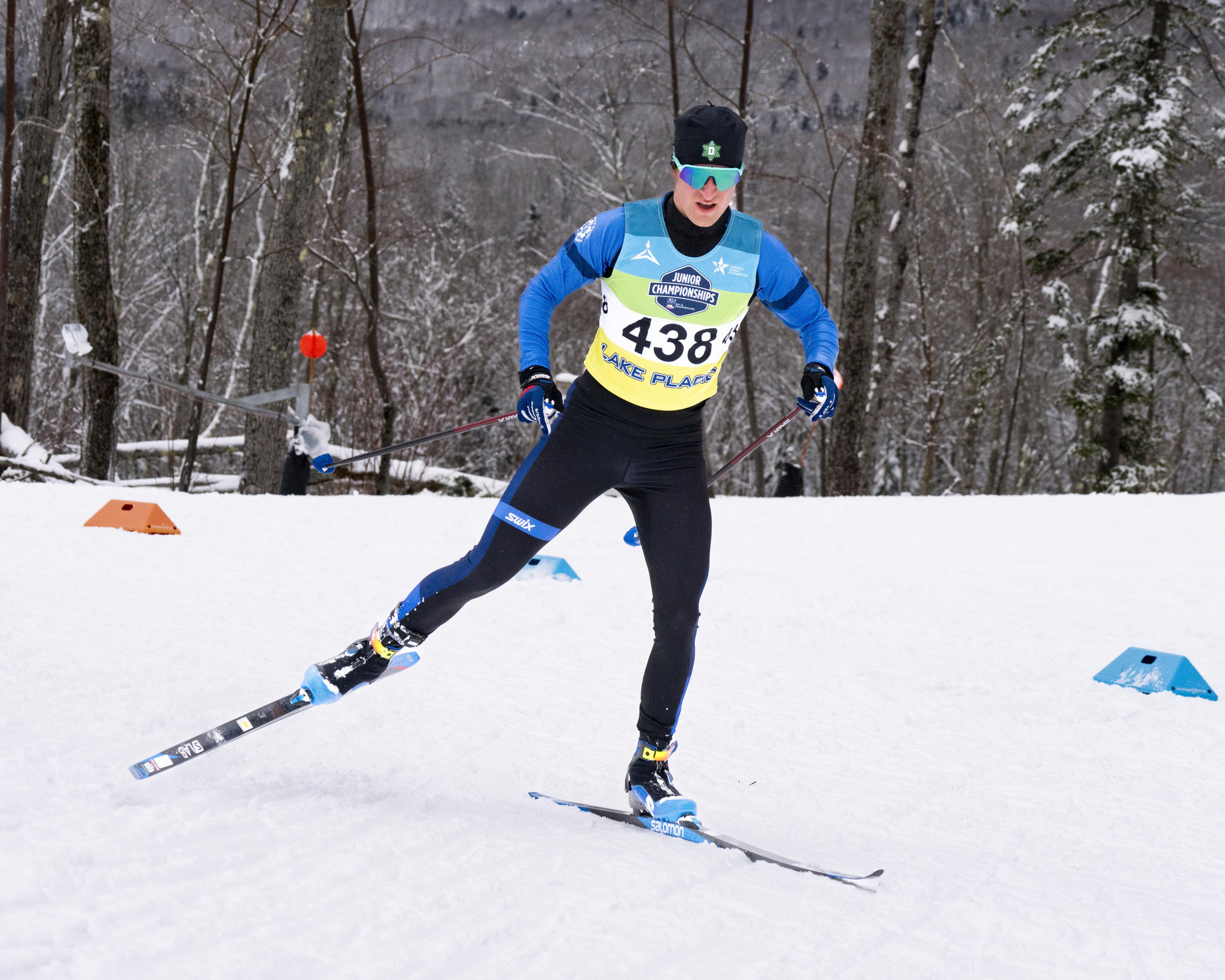
The skiers highlighting the U18/20 Boys field had come to Lake Placid after a season of globe-trotting for the United States. In the U18 field, Youth Olympic Games medalist Tabor Greenberg (New England/ Green Mountain Valley School) looked to build off his successes at JNs in Fairbanks, Alaska last year. U20 Jack Lange (New England/Dartmouth) came into Lake Placid looking to continue the success that had followed him from Senior Nationals to the EISA Carnival Circuit, NCAA Championships, and Junior World Championships earlier this season.
The two standouts would prove equal to their reputations, with Lange setting out early among the top-seeds and posting a 19:08 7.5 k that would net him a 24 second victory over the field, and a junior national championship. Likewise, Tabor Greenberg would turn in the second fastest time of the day, a 19:32, that netted him the U18 junior national championship. Following them, Great Lake’s Ben Dohlby (University of Alaska-Fairbanks) completed the overall podium, while taking second in the U20 race. Midwest’s Davis Isom (APU) rounded out the eldest age group’s podium, in fourth overall. The U18 podium, meanwhile, was completed by Alaska’s Vebjorn Flagstad (Alaska Winter Stars) in second, and his teammate Oskar Flora (APU) in third.
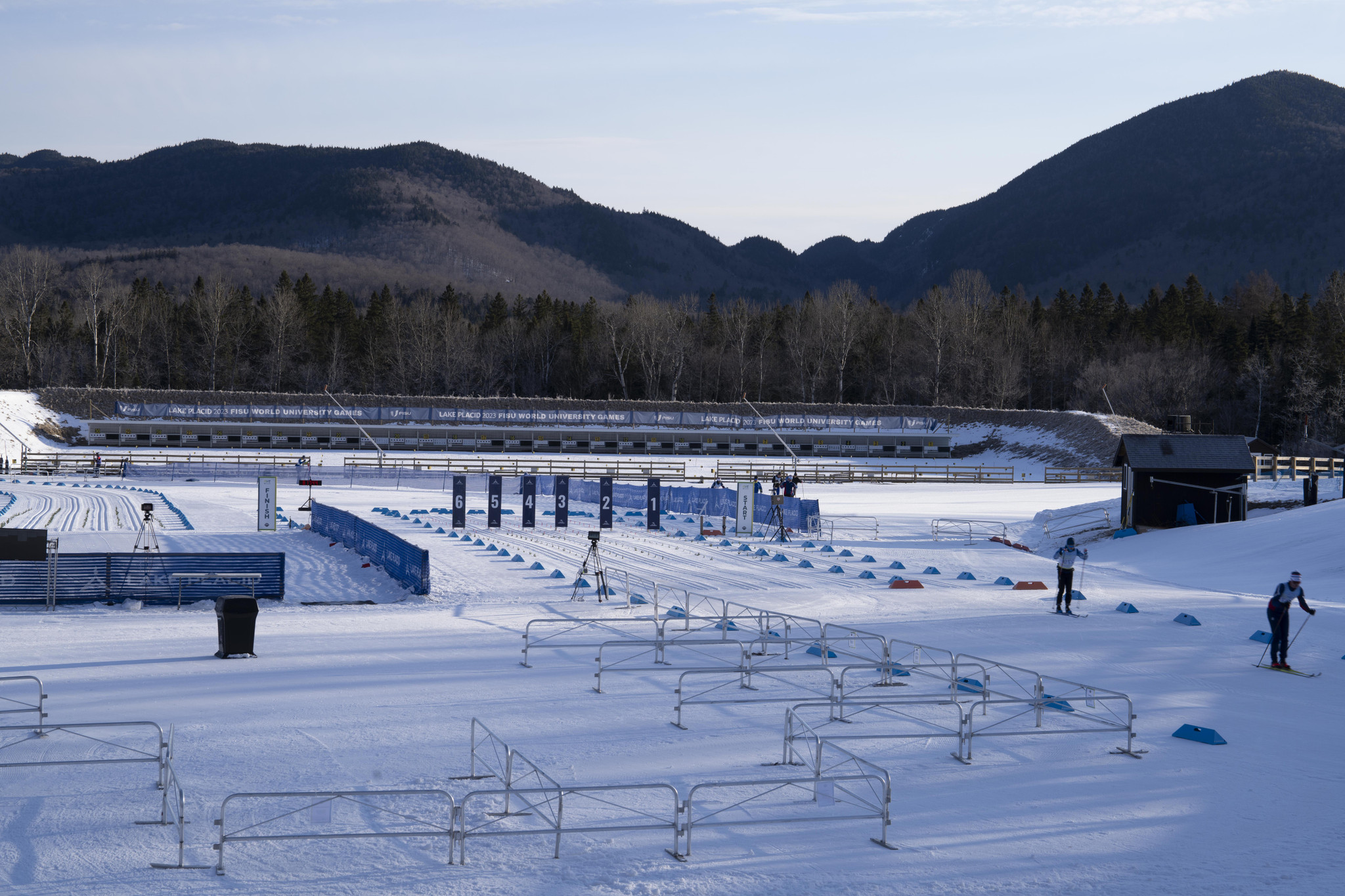
Wednesday: Classic Sprint
After the storm, spring in the Adirondacks quickly kicked into gear. The quick switch from frigid winter storm to spring sun saw many wax techs pull out hard wax for training on Tuesday, but by the time the Junior Nationals program turned to a classic sprint on Wednesday, the tins of V60 and Rode Rot had been swiped off benches, and tubes of klister emerged in their place. The sticky stuff was a necessity. The Lake Placid sprint course cut during renovations to the venue a couple years ago is as modern a course as exists in the United States including a “Ruka-esque” 180-degree turn, a punchy hill, and a long run-out setting up skiers for a sprint within a sprint to the finish.
The older U18/U20 fields raced to completion, giving the U16s some extra rest at the hotels Wednesday morning. The girls field took to the course first, with another Jackson Hole skier picking up where teammate Lena Poduska’s had left off on Monday, as Aurora Stiles turned in a 3:06 for Intermountain. The U18 girls again proved a very competitive group overall, as they occupied the top seven overall spots in qualifying ahead of first place U20 Adele Hourning. The spread from first to the last qualifier in third place in the U18 Girls field was just 12 seconds, which also served to foreshadow a round of heats in which qualifying place had little bearing on final results.
In those heats, the overall length of the Placid course, ski speed, and above all, one’s ability to ski explosively – or rather, run explosively – on the increasingly slushy sprint hill had bearing on who moved on. In the second quarterfinal heat, a quick pace set by New England’s Beth McIntosh (Green Mountain Valley School) strung out the field, with just Intermountain’s Maeve Ingelfinger (Glacier Nordic Club) able to keep effective pace. The pair worked the sprint hill, and exploded towards the finish to put up a heat time, 3:13 and 3:14, respectively, that was a full five seconds faster than the next fastest quarterfinal.
The pair of McIntosh and Ingelfinger would again meet in the first semi-final, and again, they would create a gap by exploding up the course’s sprint hill. Into the finish, however, there was a role reversal. Whereas McIntosh had bested Ingelfinger in the quarterfinal, Ingelfinger now eased towards the line to take first in the heat. It was a sign of things to come.
The Final found Ingelfinger and McIntosh matched with the other Semi-final’s winner, New England’s Amelia Circosta (Craftsbury Ski Club) and runner-up, New England’s Frances Tucker (Eastern Mass Cross Country), along with Midwest’s Sydney Drevlow (Loppet Nordic Racing), and Lena Poduska. This time, Ingelfinger showed the extent of her strength early, going off the front before there was a chance for another skier to surge to the front on the last hill. Ingelfinger eased again across the line, in the final, to take a junior national sprint championship. Behind her, Sydney Drevlow and Frances Tucker created their own gap over the rest of the field to finish second and third, respectively.
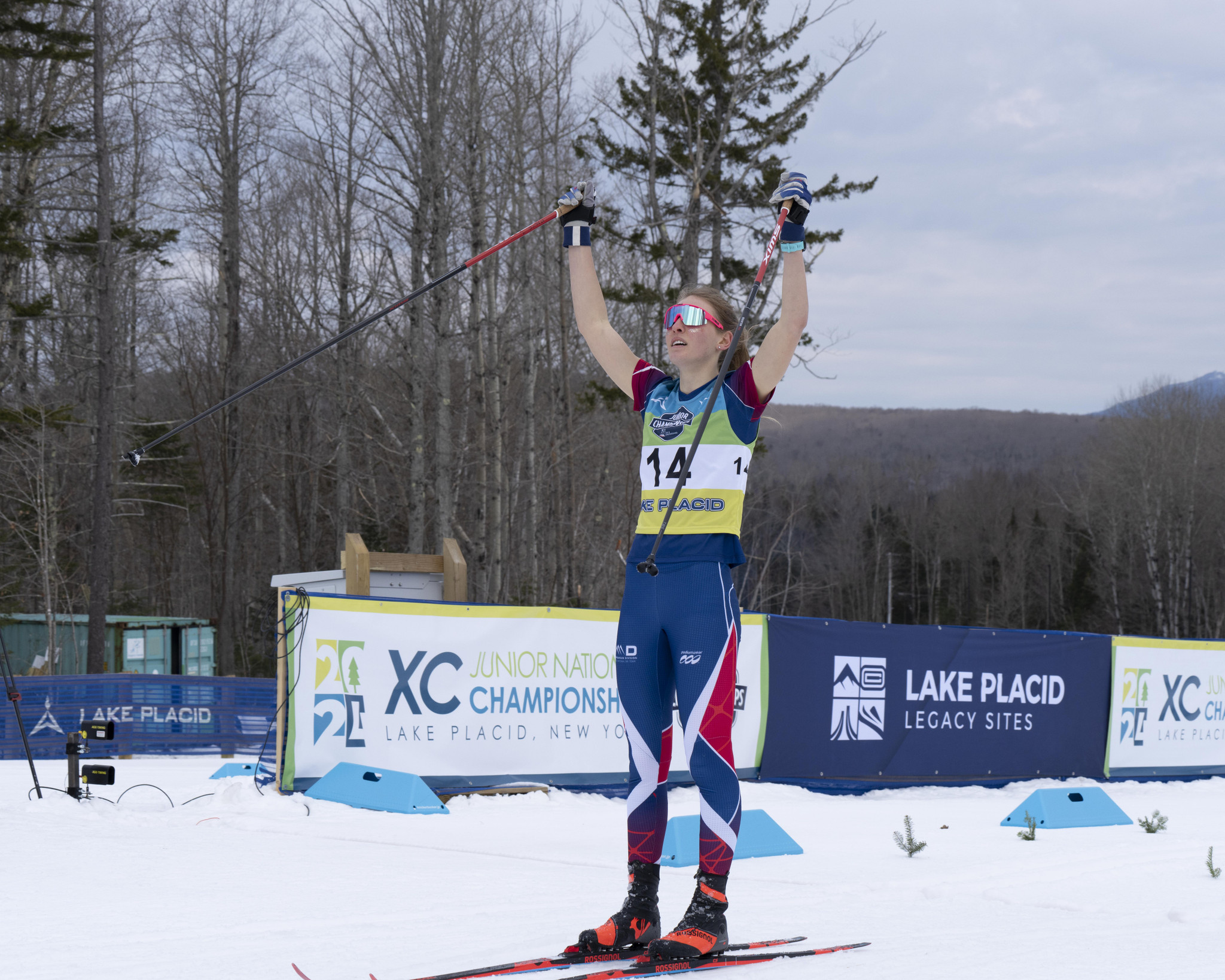
The U20 Girls would see a similarly dominate performance from New England’s Greta Kilburn (Mansfield), who won the Finals by an even greater margin of five seconds over the Alaskan pair of Marit Flora (APU) and third place Lily Pannkuk (APU).
The Men’s favorite coming into the day was New England’s Finegan Bailey (University of Vermont) in the U20’s field, following back-to-back national sprint championships in the U18 category at Minneapolis and Fairbanks the last two years. Bailey would make quick work of the qualifier, posting the top time of 2:30.83 over his UVM teammate Owen Young in second and Alaska’s Cole Flowers (Alaska Winter Stars) in third.
The U18 field was lead, meanwhile, by New England’s Anders Linseisen (Mansfield), who bested fellow New Englander Miles Miner (Green Mountain Valley School) and Alaska’s Elias Soule (Alaska Winter Stars). The U20 and U18 fields then had one thing in common. New England and Alaska had stretched the country in qualifying, and would look to cut out any skiers from the middle to battle for top honors in the heats.
They would prove successful, though the cast of characters changed from qualifying to heats as other skiers with plenty of previous sprinting credentials re-emerged at the front of the race. Notable among these notables was Alaska’s Murphy Kimball (Alaska Winter Stars), the fourth qualifier in the U18 field. Just a month ago, Kimball narrowly missed out on World Cup sprint heats in Canmore, and once he skied himself into the heats in Lake Placid, he showed it. Through the quarterfinals, semi-finals, and eventually a commanding win in the final, Kimball posted the fastest time at each turn. Controlling the Lake Placid course, and the field he skied with, in impressive fashion as he claimed his first junior national sprint title. In the final, Kimball was followed by New England’s Miles Miner in second, who was followed by his teammate Anders Linnseisen.
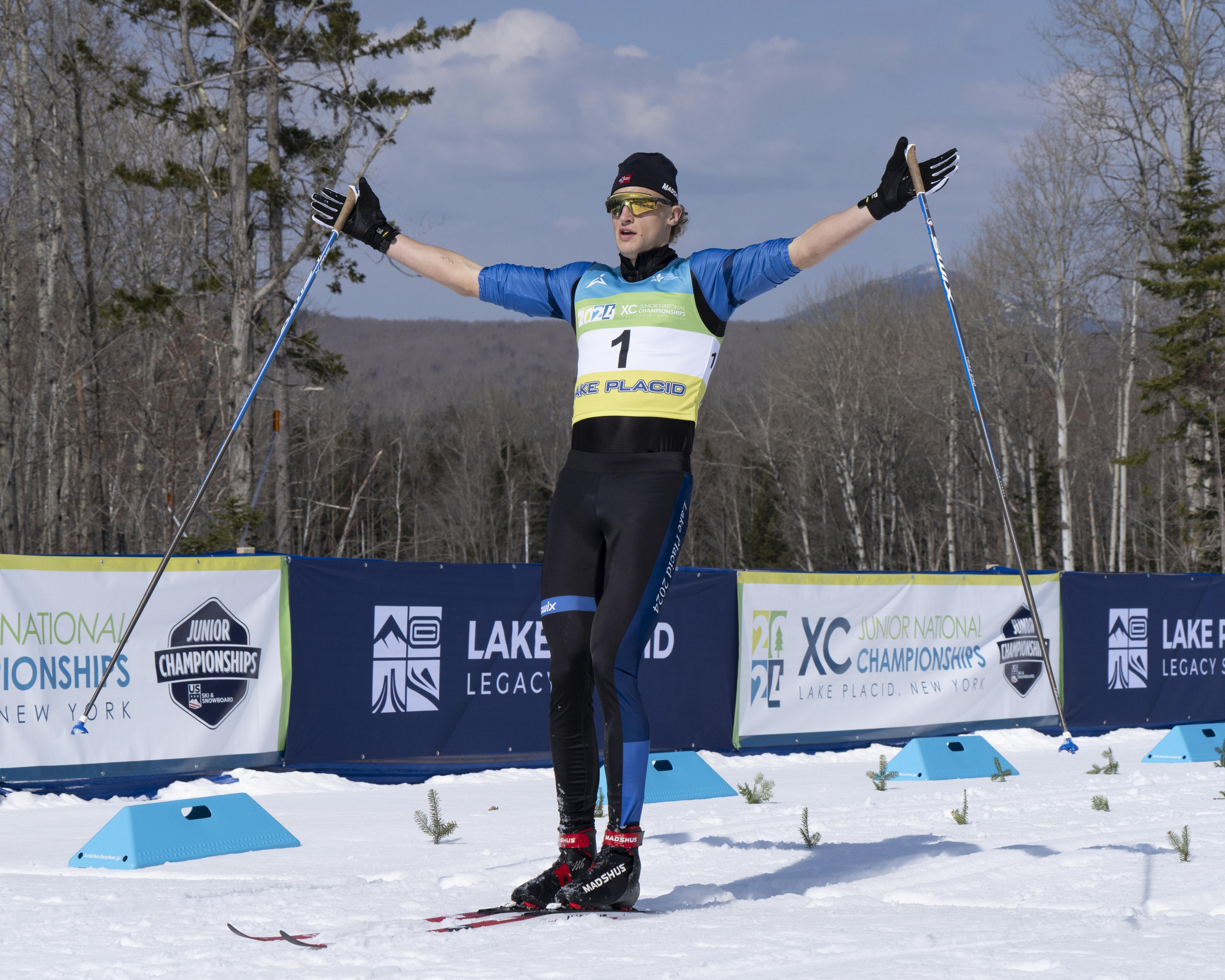
The U20 Boy’s race meanwhile, would be a challenge cup to see if any of the accomplished skiers within the field could unseat New England’s Fin Bailey. Bailey controlled his way to the Final, keeping his distance over the field in the quarterfinals and semifinals. Doing the same was Alaska’s Derek Richardson (APU), who joined in with Bailey’s move in the semi-final to progress as the second qualifier from the heat. A more precarious path was tread by his Alaska teammate Cole Flowers, who emerged out of a tightly wound semifinal heat along with Owen Young to make the sprint final.
The four skiers, two apiece for New England with Bailey and Young and Alaska with Flowers and Richardson, would make for the closest contested sprint of the day. Through the early part of the Lake Placid course, into the hill, and over-the-top, they spread but never broke, until rounding the final corner, one emerged just a bit ahead. It was a familiar sight. Fin Bailey moved into a powerful double-pole and his third consecutive junior national sprint title. Cole Flowers and Richardson won the ensuing sprint for the final, meaning the New England-Alaska duel came up with honors nearly even. New England got the champion with Bailey, while Alaska got the rest of the podium in second and third.
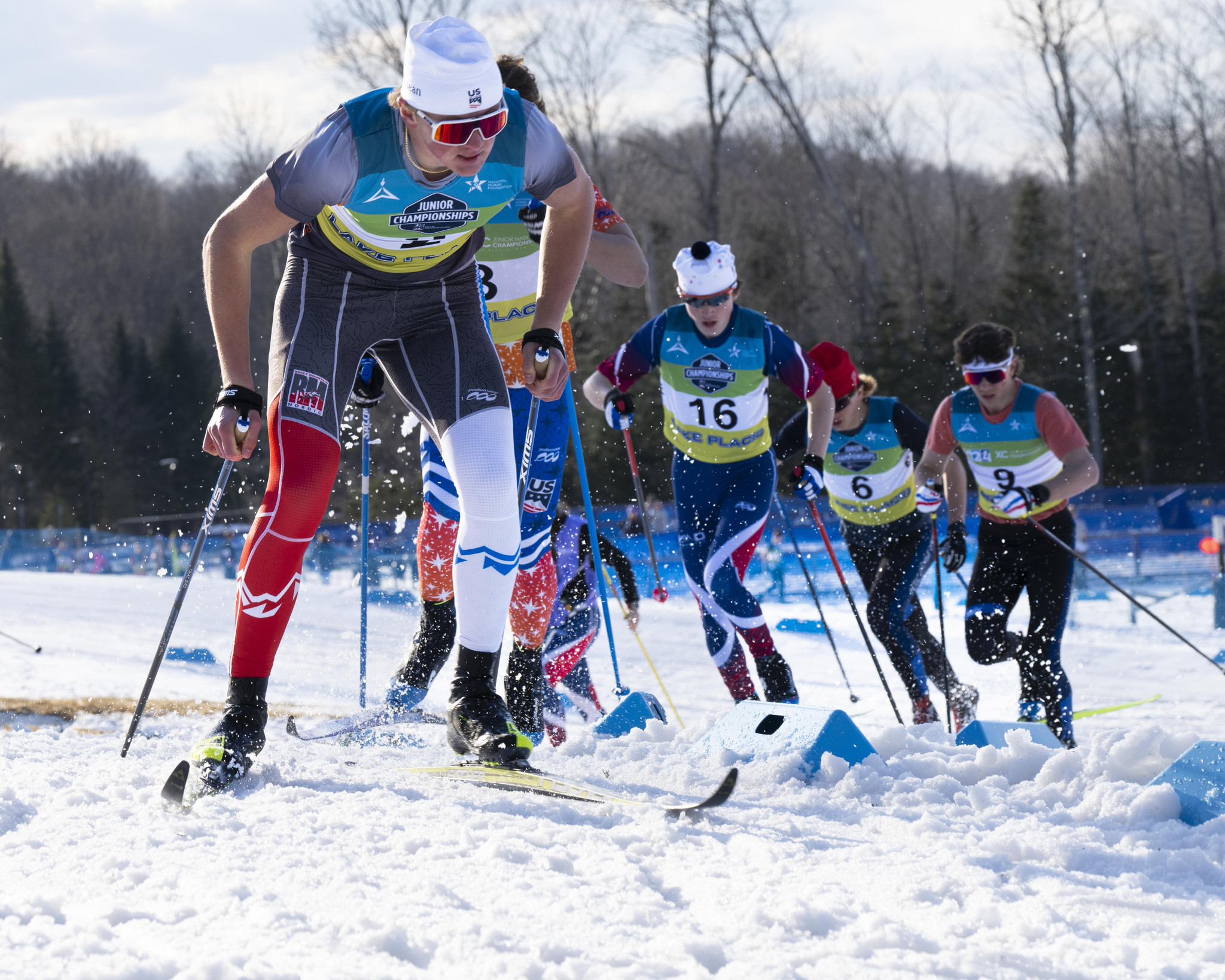
The U16 race that followed later in the day continued a trend of seeing a few select sprinters grow in strength to commanding wins through the heats. In the U16 Boys, Logan Drevlow followed up his win from Monday by qualifying third, and then posting the fastest time through each of the quarterfinal, semi-finals, and finals, to become the first back-to-back national champion in Lake Placid. In the sprint final, Drevlow fought off a late charge from Intermountain’s Ian Carmack, while Rocky Mountain’s Landon Laverdiere (Ski and Snowboard Club Vail) rounded out the podium in third place.
The U16 Girls field saw Intermountain’s Isabella Waters (Bridger Ski Foundation) follow Drevlow’s pattern. Waters posted dominate wins in her quarterfinal and semi-final, before posting a six second gap in the final over second-place Miya Kam-Magruder (Alaska/Alaska Winter Stars). New England’s Summer Bentley (Dublin XC) rounded out the podium in third place.
Friday: 15 k (U20)/10 k (U18)/5 k (U16) Classic Mass Start
Then, things got ugly. After a Thursday training day marked by sunshine, cowboy hats, t-shirts, and smiles, a couple of inches of rain and a foggy thaw greeted Junior Nationals when the program resumed on Friday for a classic mass start.
The snow that had dotted the Adirondack underbrush quickly turned to a soft muck, and the man-made snow that filled the course wasn’t too far to follow. Organizers scrambled. Along with a groomer, salt (or rather, what was described as a “urea treatment”) was deployed on corners to draw moisture out of the rain-saturated snow, and a ski-pack crew with Alpine equipment was sent out to try and break up crusted ice.
The steps taken all carried an implied truth about the nature of the Lake Placid course. Under ideal conditions, the steep hills cut into the side of Mt. Van Hoevenberg’s ski course offer flattering allusions to the free-sliding Bobsled course that covers the opposite slope onsite. Under the conditions present on Friday though, they were more a version of a nightmare those allusions might inspire, as if you’d been put into a bobsled and told to control the thing as it careened on sheer ice towards impossible speeds.
Nonetheless, the U16 field would brave the trail conditions first, slated to complete a 2×2.5 k lap in a 5 k classic mass start that climbed up the first steep pitch at the bottom of Mt. Van Hoevenberg, then wound downhill and into a fast-sweeping turn leading to the sprint hill, stadium, and finish. The experienced reader may guess which clause of the previous sentence proved to be the problem (“begin with wound downhill…”).
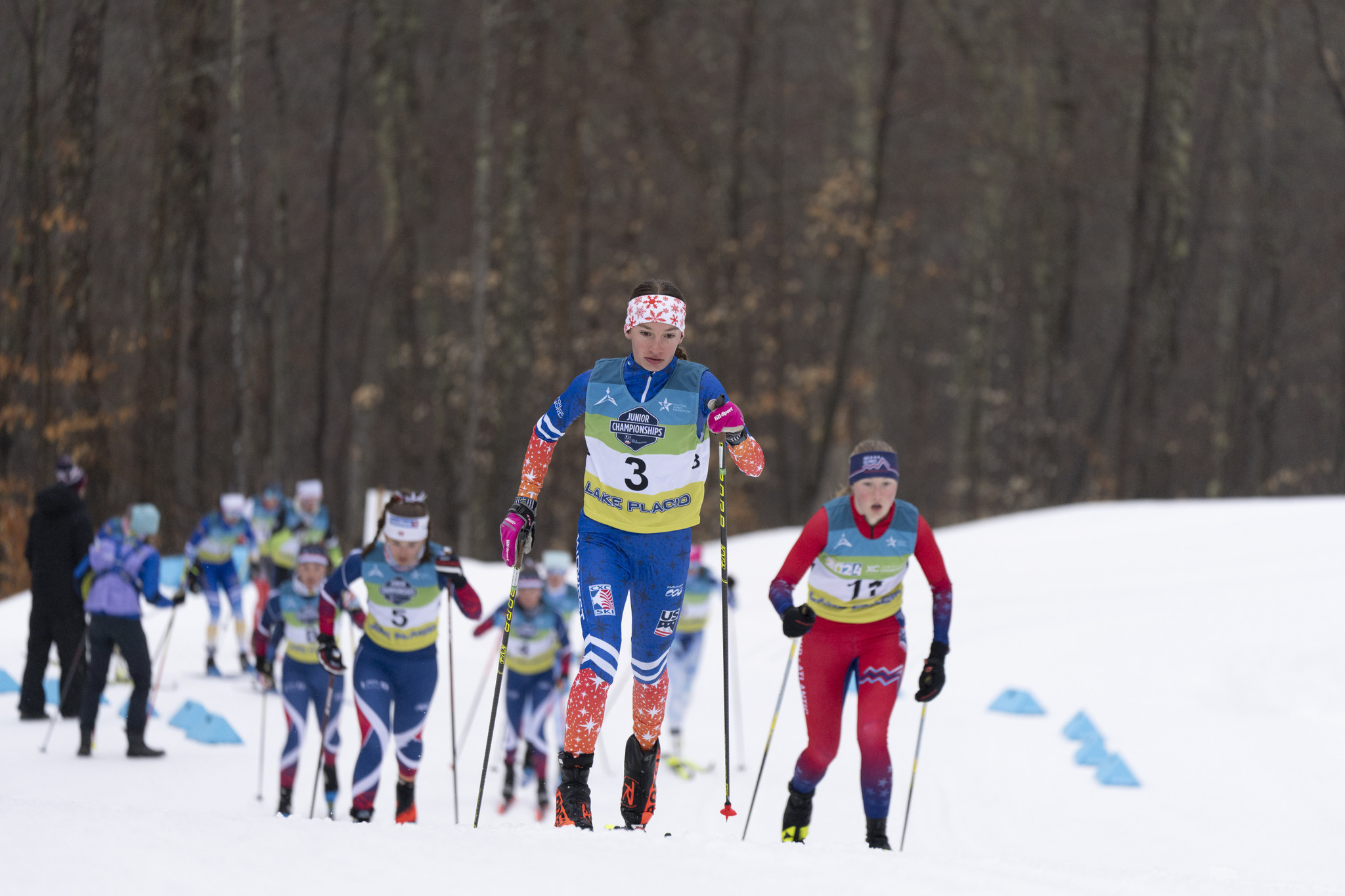
The early pack was led by Midwest’s Linnea Ousdigian, who made an early break with a few other skiers, including Mid-Atlantic’s Cora Hinsdill (Unaffiliated), that showed racing wisdom well beyond their U16 years. Ousdigian and Hinsdill were able to eventually hold their moves, and crucially, take controlled lines through the course, with Ousdigian taking more time to win a national championship with Hinsdill runner-up.
The ability to take controlled lines would prove to be a decisive luxury for early-movers throughout the day. The reason; the combination of factors in the air and snow at Lake Placid were combining into a treacherous brew where the course took on the fall line of Mt. Van Hoevenberg. Into the final corner leading to the Lake Placid sprint hill, the moisture-sucking treatment had left a firm and fast-moving track near the top of the hill, while the wear-and-tear of skis through softer snow near the bottom, and air temps creeping back towards freezing, was leading to deep, slow, ruts where skis went in, and their owner lost all control over where they went.
Through the rest of the field, falls came from nearly every group of racers. Some racers got up quick, some others collected themselves at the side of the trail, and a few got lucky with their track and got to ski on. Emerging at the top of this pack to take the final spot on the U16 Girls podium was Far West’s Sierra Strecker (Tahoe Endurance).
The first race of the day would define a kind of helpless truth that would dictate the rest of the day; it was a sloppy day, and there was no other way to race well but to race sloppy.
In the following U16 Boys start, Logan Drevlow was again at the front of the race, and showed his continued prowess over the field. Not even an early break-away though, could prevent the now established best skier in the country at the age group from having a fall in the Lake Placid snow. On his second lap, Drevlow fell going into the final climb, then pulled up with a broken ski, and then proceeded to power over the sprint hill into an all-double pole finish to round out a Junior Nationals sweep for the young Minnesotan.
Drevlow’s fall had allowed a late challenge from Far West’s Luka Karnickis (Tahoe Endurance), who would finish ahead of Ian Carmack to round out the U16 Boys podium.
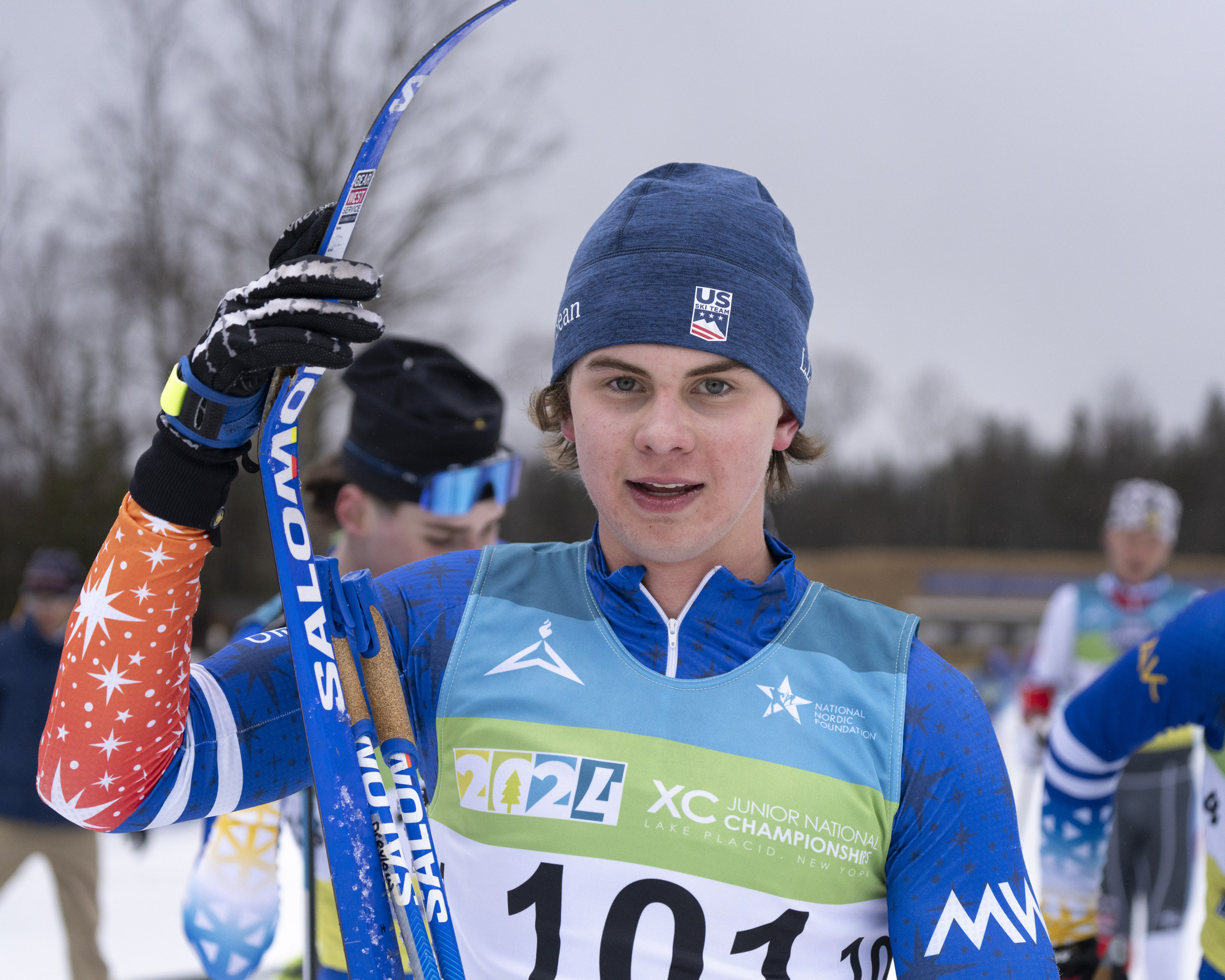
Then, a delay. As the U16 Boys field suffered the same fate as the Girls before them, message buzzed out to the JNs Coaches. The older U18/20 races slated to start were on hold to re-evaluate the safety and speed of the downhills on course. Eventually, a decision was made to start the races after a three-hour delay to re-work the snow going into the final downhill, and a course change that saw all racers take on less laps, completing a 5 k, rather than 3.5 k course.
A collective sigh rang over Lake Placid as the decision was made. Mixed in there were some singing relief – wax techs that wanted a little more time to figure out what was going on in the snow, parents who could go get lunch – and some anxiety too – racers contemplating what exactly they were getting into on course.
An aura shown through what was other a very bleak scene. The whole scene was a subtle reminder of the beauty of ski racing; that even when all human elements have been orchestrated to make Nationals the big event, with seemingly everything on the line, it’s still a supremely whimsical sport, with life breathed into it by the natural elements it relies on to happen. When the snow won’t go, you can’t make it, and so as the U18 Girls prepared to start racing again Friday afternoon, the pressure seemed to back off from the JNs field, and the field seemed re-focused on just what fun it is to put on skis with one hundred of your closest friends and competitors from across the country to race.
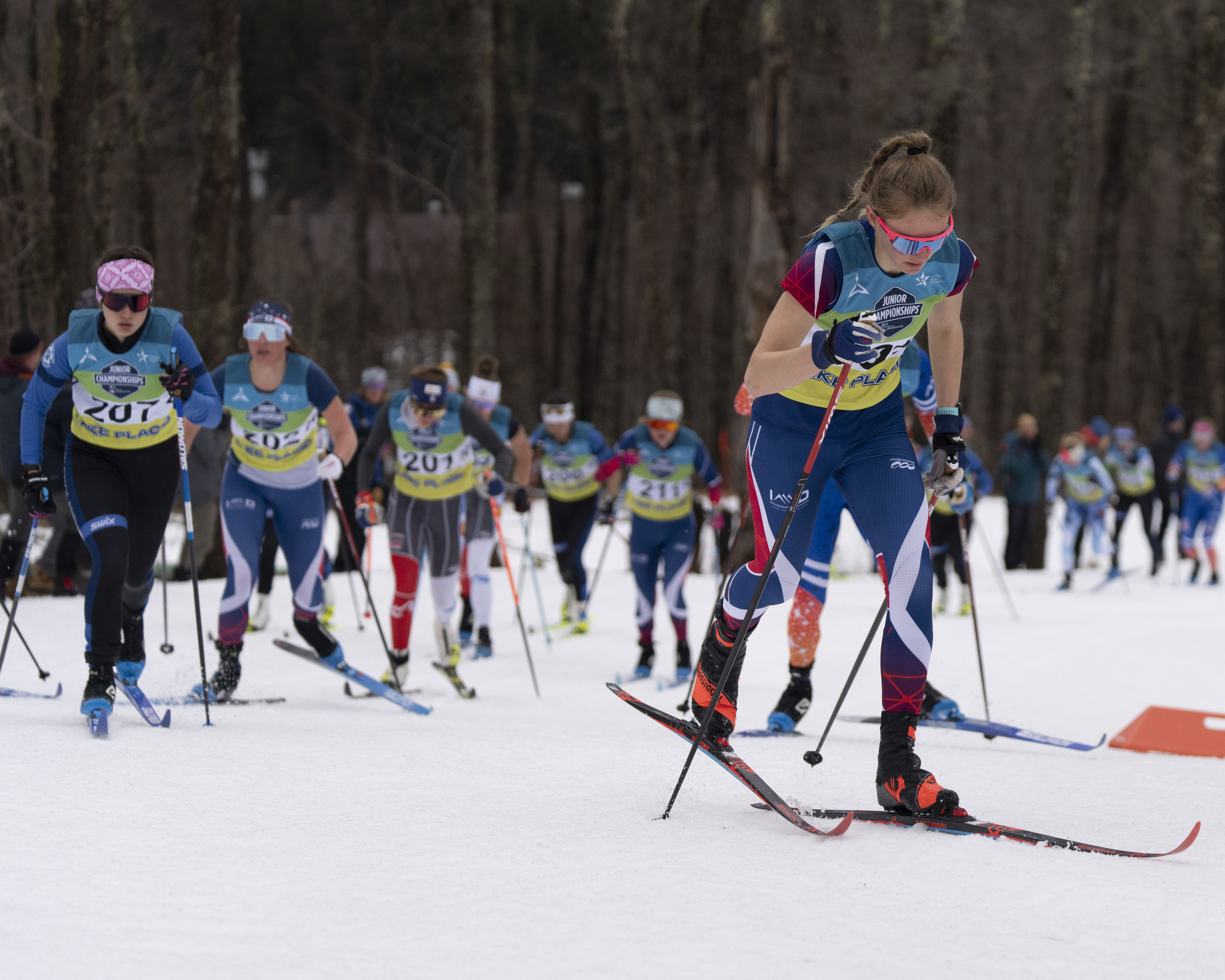
The U18 Girls race that did wind out on the now-5 k loop was fronted by Wednesday’s winner, as Intermountain’s Maeve Ingelfinger led an early pack containing roughly 12 skiers into the Lake Placid climbs, and the field soon stretched out. Following Ingelfinger closely was High Plain’s Ally Wheeler (Casper Nordic), along with Britta Johnson.
As the leaders wound through sprint hill downhill that had caused the day’s delays, conditions initially looked like they had improved. The lead pack had stretched, but nearly all the lead racers were able to step into stride on the downhill with speed from a corner well-taken. The illusion though, was shattered in short order, as the subsequent field chewed the corner up and the same “fast up top, slow through the bottom” problem emerged, along with the carnage it caused too.
The second lap saw Wheeler and Ingelfinger stretch their lead to a set-up a decisive battle in the last stretch of the 10 k race. Ingelfinger, fresh off a classic sprint win on Wednesday, showed her prowess again, and became the week’s second back-to-back champion. Ally Wheeler finished in second place, with Britta Johnson (Tahoe Endurance) rounding out the podium in third for Far West. Behind the podium, the results list became more-and-more defined by crashes that had creeped up the field from the first lap. It would foreshadow the deteriorating conditions that would again characterize the races that occurred after one field had already run skis on the course.
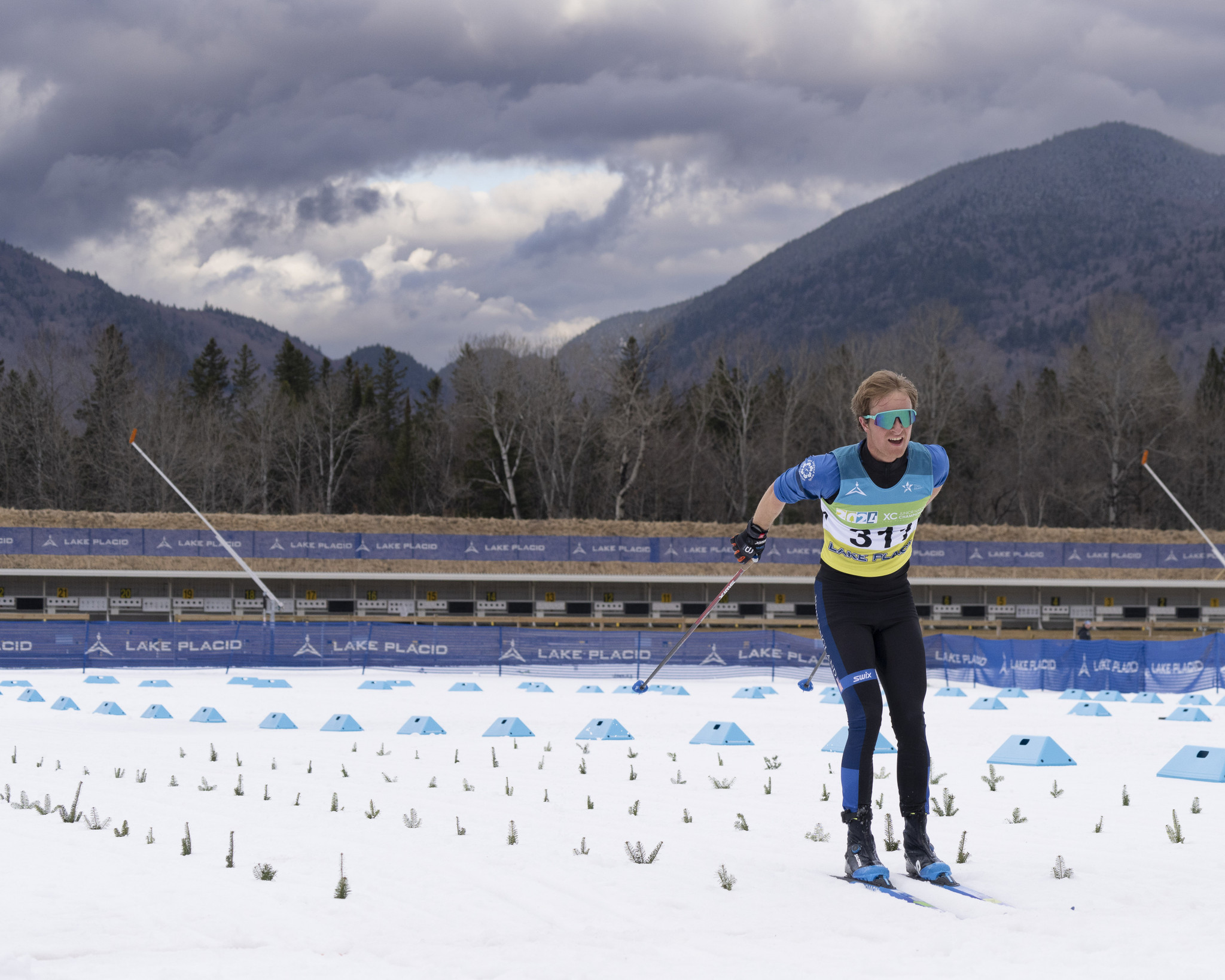
In the U18 Boys race that started next, the early-formed lead pack saw a fall before it even reached the first climb. Perhaps sensing that more of those falls may be ahead, Tabor Greenberg broke away early and held his lead through the entirety of 10 k, eventually winning over Far West’s Dane Karch (Tahoe Endurance) by 25 seconds. Karch would follow Greenberg’s example when he could gain an advantage over the field, and carried a solo gap over third place Aidan Jacobus (New England/Green Mountain Valley School), who rounded out the podium of the race.
The U20 races would see similar moves to go early from the race’s eventual winners. In the Boys race, New England’s Jack Lange moved to a one-minute twenty-second gap over his teammate Fin Bailey, with Luke Rizio (Prospect Mountain Ski Club) adding to a New England sweep in third place. Greta Kilburn would make a move that stretched her lead even beyond Lange’s, with the New Englander winning the U20 Girls race by nearly one-minute forty-five seconds over her teammate Mirra Payson (Bowdoin), while Adele Hourning rounded out the podium with third place for Rocky Mountain.
Saturday – 4×3 k Mixed Skate Relay
Friday’s conditions are made for the kind of racing memories that foreground the memories of the experience, rather than results, when Junior Nationals are looked back upon. Saturday seemed to cement those sentiments, as from its one-year hiatus, the ever-popular Junior Nationals Relay was brought back in to round out the 2024 racing program.
When the Junior Nationals relay was last run in Minneapolis two years ago, it featured a crucial update to the traditional 4×3.3 k format; Mixed genders. Two male racers and two female, alternating legs. The change proved a popular one, as it kept with the trend from higher levels of international skiing, including the World Cup, and because it suddenly made for a more total test for each division. The 2024 Lake Placid Relay kept to the Minneapolis format to the letter.
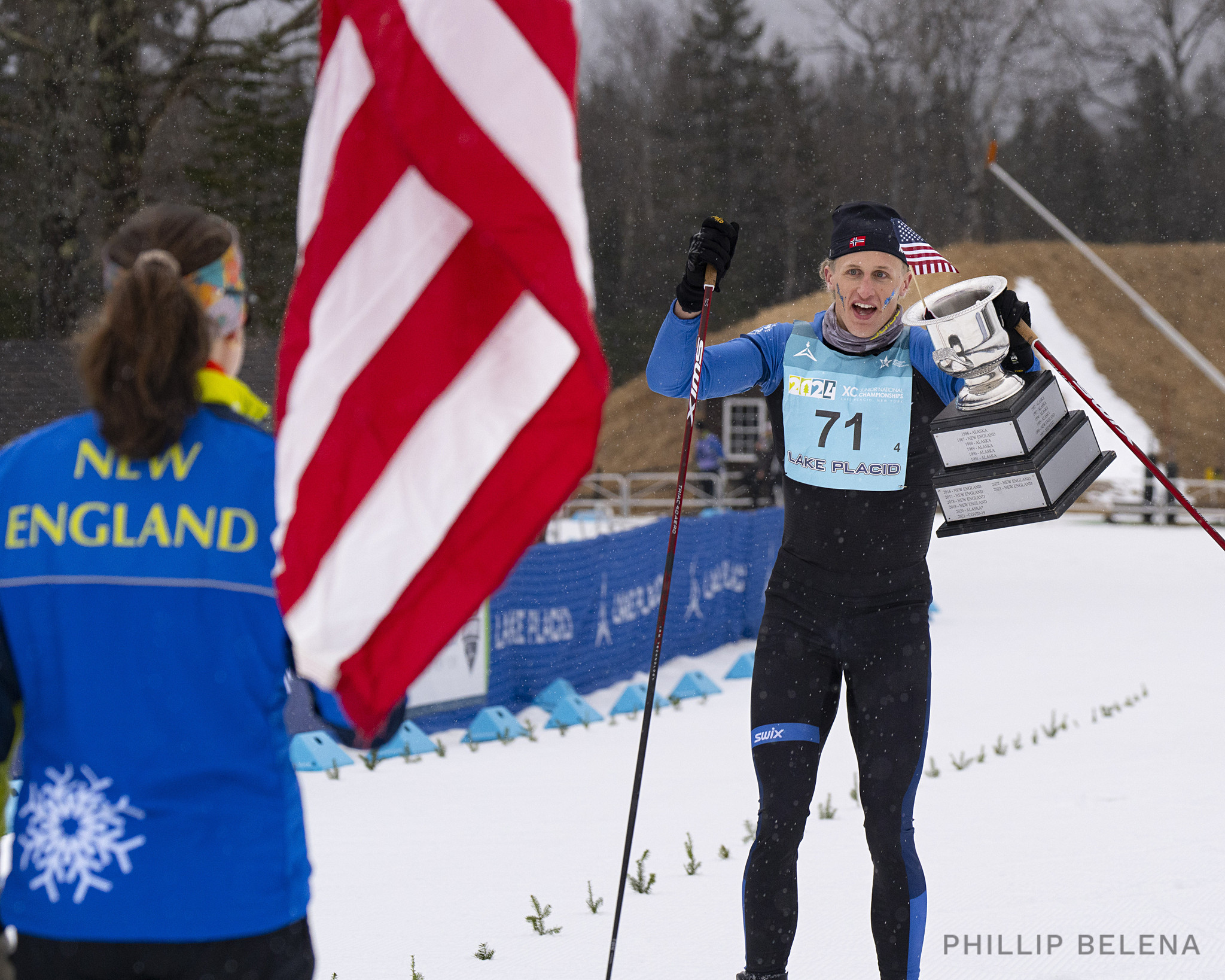
The U20 skiers began the race day under conditions that had started to improve from the previous day’s fog, rain, and slop. Heading into the 3 k distance, the heavy New England-Alaska battle from Wednesday’s sprint loomed large, and as the first leg, skied by the first Girls skiers, it was no surprise that New England I with Mirra Payson, and Alaska I with Rosie Whittington-Evans, formed two parts of a lead group that also included two Intermountain teams. Near the end of the lap, Whittington-Evans made a move to give Alaska I the advantage headed into the first Boys leg, to be skied by Derek Richardson. Richardson was able to make the Alaskan split over the field decisive, but he was joined by New England I’s Jack Lange, who bridged the gap to set up the duel that had been alluded to earlier in the week.
Alaska handed off to Marit Flora, while New England handed off to Greta Kilburn. Kilburn used the climb that made the bulk of the course to pass the Alaskan and build a sizeable lead that, in retrospect, was decisive in the race. Kilburn handed-off to Fin Bailey, who just had to maintain the lead Kilburn had opened. Bailey was left to ski a triumphant parade lap into the finish, picking up the Alaskan Cup in a decisive move that marked New England’s team dominance over the entire week’s racing. Alaska I finished fifteen seconds later, while Far West I held a move from Matt Seline (University of Alaska-Anchorage) to round out the podium.
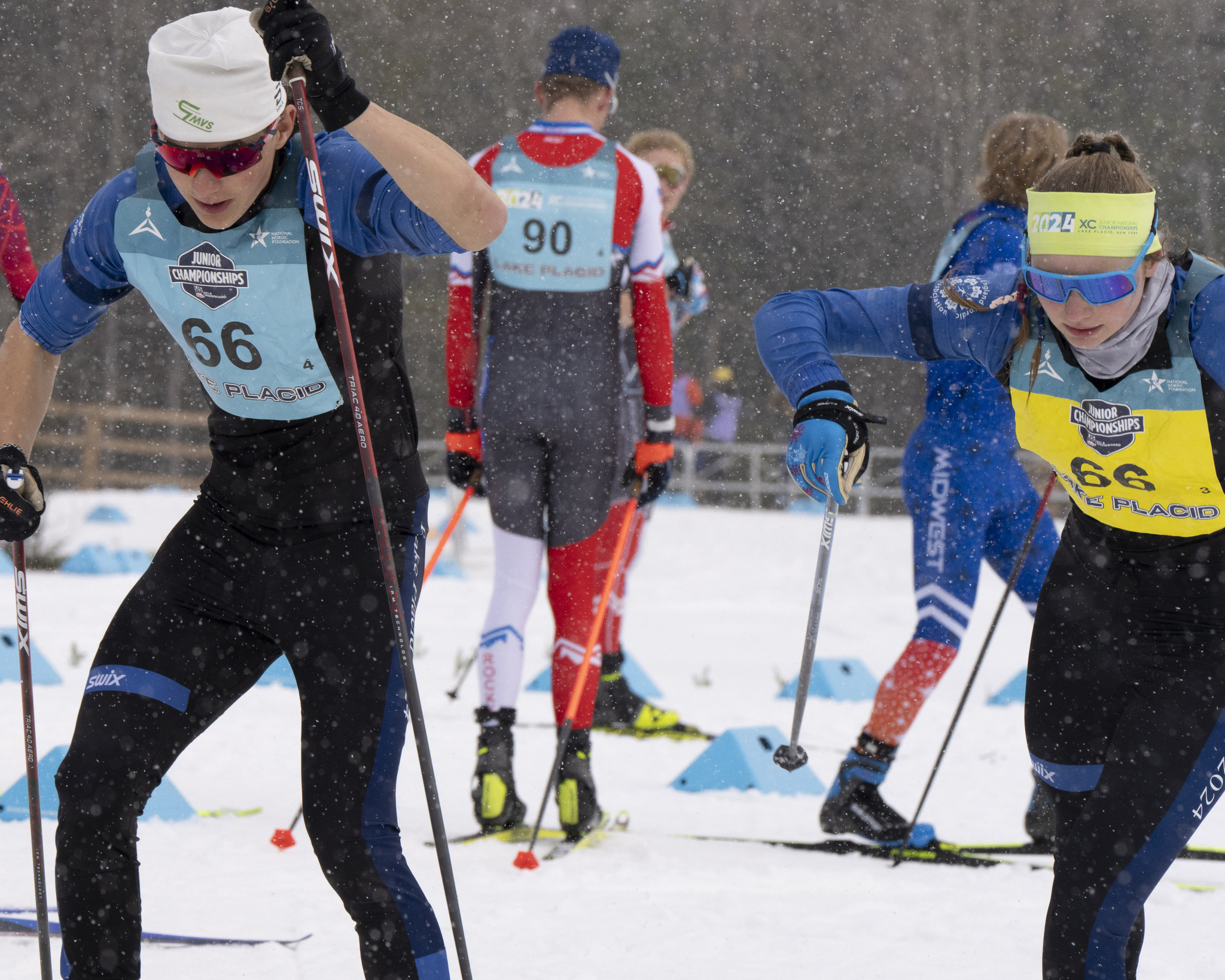
The New England-Alaska battle in the U20s belied that Far West’s performance in the U20 race was the greatest foreshadow of who would be putting relay teams near the front of the pack through the younger age groups. In the U18 race, Far West I’s Britta Johnson came into the first exchange to Quinn Holan with a ten-second gap over the field that would grow through exchanges to Niki Johnson and Dane Karch to score a win for the Californians. Behind, a pitched battle between Intermountain I and New England II resulted in a narrow second place for Intermountain and third for New England II.
The same divisions were in play as the final race on the Junior Nationals Program, the U16 Relay, started on course. An early push from Lea Perreard put New England I in first going into the first exchange, while Far West with Sierra Strecker and Intermountain with Isabella Waters formed a two-team chase pack. Through the second leg, Matthew McIntosh (Green Mountain Valley School) kept New England I in the lead, while Odin Berryman (Unaffiliated) skied Intermountain into second, with Elio Adriani (Tahoe Endurance) kept Far West in it in third place.
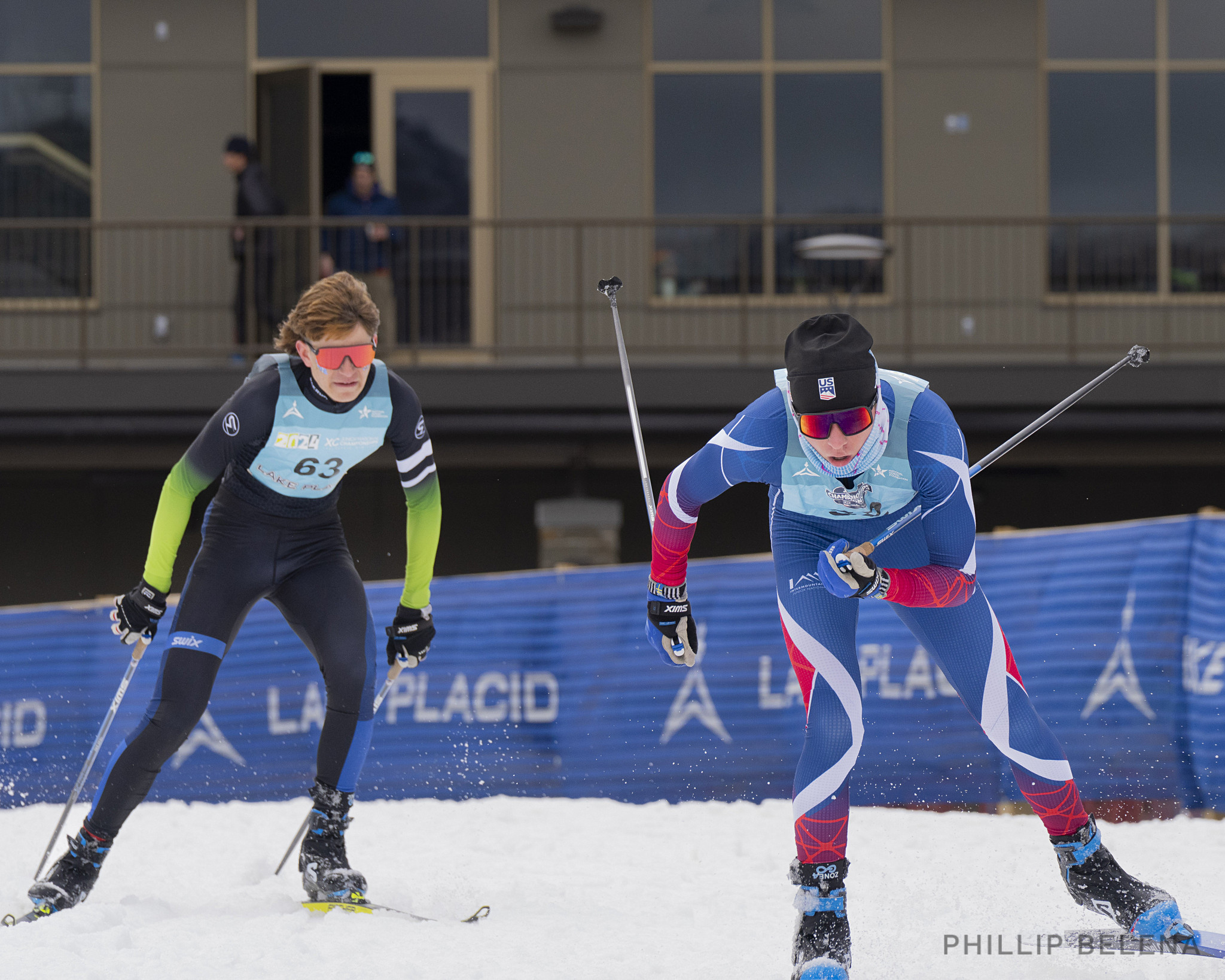
During the third leg, the New England I gap remained strong with Mary Harrington (Green Mountain Valley School), while Intermountain I extended its gap over Far West I with Tula Higman (Bridger Ski Foundation). Still, into the final exchange, the gap between first and second was twenty-seconds. Matias Citarella (Green Mountain Valley School) was tasked with holding it for New England I. Ian Carmack was tasked with closing it for Intermountain I. As the skiers wound up the Lake Placid climb, it looked vaguely possible that Carmack could do it, until, almost in an instant, the pitch relieved on the hill, and Carmack was well within skiing distance of Citarella. Through the downhill, Carmack would chase, and chase, until coming into the stadium, he was ahead of the New England I skier. He pushed, and came across the line suddenly having reversed roles. Intermountain I took first place, New England I second, while Far West closed out the week of podium by book-ending the day. A third in the U20 race, followed by a third in the U16 race, and with a bright future ahead.
The falling snow made Lake Placid what it has always been for US Skiing: a touchstone. The skiers who competed in this Junior Nationals will go on to shape a sport and it’s a community in ways that can’t be predicted, and a community will be inspired by the miracle they represent.
Full 2024 Junior National Championships RESULTS
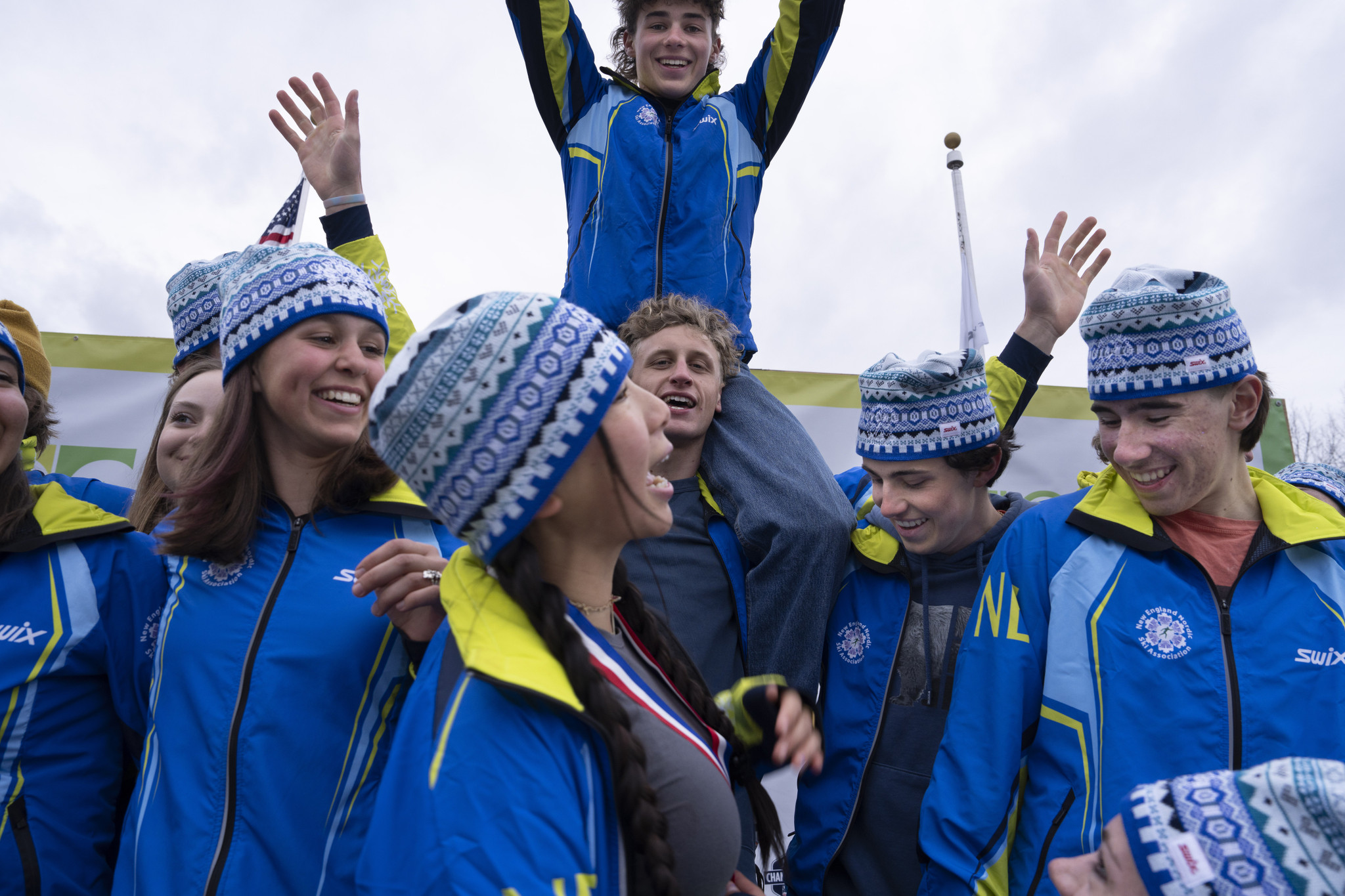
Ben Theyerl
Ben Theyerl was born into a family now three-generations into nordic ski racing in the US. He grew up skiing for Chippewa Valley Nordic in his native Eau Claire, Wisconsin, before spending four years racing for Colby College in Maine. He currently mixes writing and skiing while based out of Crested Butte, CO, where he coaches the best group of high schoolers one could hope to find.



